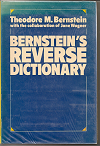

| Book of the Month | ||
 |
Bernstein's Reverse Dictionary |  |
Publisher: Routledge & Kegan Paul
Author: T. Bernstein (with J. Wagner)
$34.95
ISBN 0 7100 8367x
What is a reverse dictionary? Well, a regular dictionary is for when you find a word which you do not understand. You then look up that work in the dictionary, and get the meaning. However, many language students will know that there are times when one knows that a word exists, but while the meaning is clear, the actual word is unknown or forgotten. For example, a student may know that there is probably an English word for 'a person who makes barrels', but how can this word be discovered? This is where a reverse dictionary is very useful. Look up 'Barrel-maker' and a reverse dictionary gives 'cooper'. So a reverse dictionary works by giving a list of definitions that you can look up to find words - the reverse of a regular dictionary, where you look up words to find definitions. For a language student both types of dictionary are important. The particular dictionary reviewed here has been compiled by Theodore Bernstein, author of books on the usage of English such as The Careful Writer and Watch Your Language.
The book starts with a brief introduction which describes why the author decided to invent the idea. (He was trying to remember the word 'palindrome'.) It then goes on to describe how to use the book, which has entries for over 13,000 words. With this description we also realise the major problem with a book of this kind. That is, the words which one person uses for a definition might be different from the description used by another. So looking for 'serving' or 'country' girl failed to produce the word 'wench', though the dictionary did produce the useful reminder that the collective noun for a group of girls is a 'bevy'. One should also note that this book also gives the technical names for some sexual activities which younger readers may not be aware of, let alone be able to describe accurately.
For both the student and those who love words, there is much pleasure to be found by simply browsing through the book, and discovering that, for example, a tightrope-walker is a 'funambulist', or that something pointed or sharp-edged is 'cultrate'. However these examples are some of the more exotic words - many of the more common, everyday ('mundane') words are basically synonyms. For example 'negligent' and 'careless' define 'remiss', but with this and many other examples, the reverse dictionary could work, well, in reverse with 'remiss' defining 'negligent'. In short, sometimes this book is simply a slim thesaurus.
If a search has not managed to turn up the missing word, then the reader must turn to the 75-page index of 'target words' at the back of the book. This search revealed that the word 'wench' is not in the dictionary at all. This is not perhaps surprising, because even a book three times the size would not have even a tenth of all the words in the English language. And this is the final failing of this book - it has lost some of its usefulness with time (become obsolete)- today the job of a reverse dictionary is done by several internet sites which provide this service for free. And the online service have larger databases of definitions, up-to-date definitions of slang, and no limits on dictionary size.
Who is this book for? Those with access to an internet connection can do 'reverse dictionary lookups' more quickly and conveniently than those using a paper book. However, this book is still useful for those wanting to read for the pleasure of discivering words which they did not know existed. Discovering something good or pleasant that one was not even looking for is always a happy experience. The reverse dictionary can tell you the word for such an experience - it is 'serendipidity'.
Verdict: Mostly replaced by the internet
Assessment 4/10